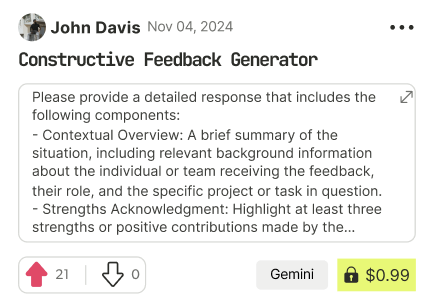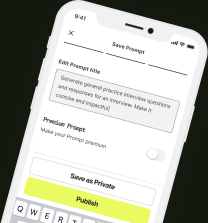prompt mine App
Find, Create & Share AI Magic
Designing a Unique Party Game: "Laugh Out Loud Champions"
Game Overview: "Laugh Out Loud Champions" is a light-hearted party game designed for groups of 8-10 adults, focusing on creativity, humor, and friendly competition. Players take turns presenting ridiculous challenges, acting out humorous skits, and showcasing their artistic skills, all while competing to become the ultimate "Laugh Out Loud Champion."
Materials Needed:
A large, open game area (living room, event space, or outdoor setting)
Whiteboard or large paper for brainstorming and scorekeeping
Markers or colored pens for writing and drawing
A random selection of props (hats, wigs, glasses, etc.)
A playlist of upbeat music
A camera or smartphone for capturing memories (optional)
Setup and Rules:
1. Divide the group into two teams of 4-5 players each. Encourage team members to introduce themselves and establish a team name.
2. Explain the game format: The game consists of three rounds, each featuring a different challenge. Teams will take turns presenting their challenges, and the opposing team will attempt to complete them.
3. Round 1: "Laugh Out Loud Challenge"
Each team takes turns drawing a challenge card, which contains a ridiculous task (e.g., "Sing a song about a chicken wearing roller skates").
The team must work together to complete the challenge, using props and creativity to make it as humorous as possible.
The opposing team will judge the challenge, awarding points based on creativity, humor, and overall entertainment value.
4. Round 2: "Artistic Showdown"
Each team is given a random theme (e.g., "Futuristic Cityscape") and a set amount of time (e.g., 10 minutes) to create a collaborative art piece using markers or colored pens.
The team must incorporate at least three props into their artwork.
The opposing team will judge the artwork, awarding points based on creativity, humor, and overall aesthetic appeal.
5. Round 3: "Skit-astic Skit-Off"
Each team is given a random theme (e.g., "Time Travelers") and a set amount of time (e.g., 5 minutes) to create a short skit.
The team must incorporate at least two props and a designated "twist" element (e.g., a surprise guest star).
The opposing team will judge the skit, awarding points based on creativity, humor, and overall entertainment value.
6. Scoring and Winning:
The team with the most points at the end of the three rounds wins the game.
In the event of a tie, the teams will participate in a sudden-death challenge, where they must complete a randomly selected task (e.g., "Dance like a robot for 30 seconds").
Tips for Keeping the Game Engaging:
Encourage teams to be creative and silly, and to support each other throughout the game.
Offer bonus points for exceptional performances or particularly entertaining challenges.
Keep the game moving at a steady pace, with minimal downtime between challenges.
Consider having a designated "host" or "emcee" to facilitate the game and keep the energy high.
Adapt the game to fit the event theme by incorporating themed challenges, props, and decorations.
Adaptability:
For smaller groups, reduce the number of teams or have individuals compete against each other.
For larger groups, add more teams or create a tournament-style competition.
For a more competitive atmosphere, introduce a "stealing" mechanism, where teams can steal a challenge from the opposing team and attempt to complete it themselves.
For a more cooperative atmosphere, have teams work together to complete challenges, sharing points and rewards.

Designing a Unique Party Game: "Laugh Out Loud Champions"


Find Powerful AI Prompts
Discover, create, and customize prompts with different models, from ChatGPT to Gemini in seconds

Simple Yet Powerful
Start with an idea and use expert prompts to bring your vision to life!